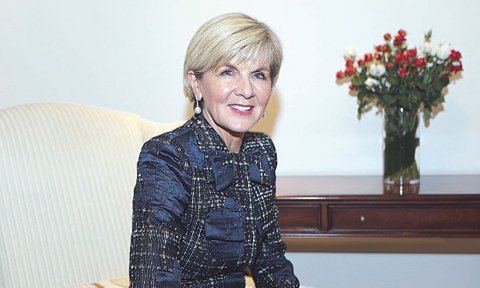 KUWAIT: Australian Foreign Minister Julie Bishop. —Photo by Joseph Shagra
KUWAIT: Australian Foreign Minister Julie Bishop. —Photo by Joseph ShagraKUWAIT: Australian Foreign Minister Julie Bishop wrapped up her visit yesterday and thanked Kuwait for its significant contribution to humanitarian work and its special role in rebuilding Iraq. Bishop met several officials here, including Kuwaiti Deputy Prime Minister and Foreign Minister Sheikh Sabah Al-Khaled Al-Sabah. She said they had very positive discussions on various issues and opportunities for greater engagement between Australia and Kuwait, particularly in trade and investment.
"While we are quite far geographically, after arriving here, it takes only a moment to realize that we have amazing synergies between our economies," she said. "There are significant Kuwaiti investments in Australia in two sectors; liquefied natural gas (LNG) and electricity. We see more opportunities for investments in Australia; likewise, opportunities for Australian companies in Kuwait. We have several Australian companies here. Educational cooperation is another important area with great potentials. Many Kuwaiti students are studying in Australia, and we would love to see more," Bishop said.
"We also discussed tourism, and encourage more Kuwaitis to visit Australia and Australians to come to Kuwait. We discussed agriculture and see the potential for improvement. Overall, there were very positive meetings and opportunities for both countries," she emphasized. Bishop said Kuwait-Australia bilateral relations are excellent and strong, and lauded the country for its successful hosting of the conference of the global coalition to fight IS. "We discussed counterterrorism issues too - Kuwait is an important part of the Gulf, and we see increasing Australian engagements with Kuwait," she noted.
Leadership role
Bishop hailed Kuwait's humanitarian role, saying it has always been a leader in many fields, stressing the importance of Kuwait in the Gulf Cooperation Council (GCC). "I would like to see our relationship deepen," she said. The ministers signed a memorandum of understanding to establish regular meetings between the officials, and Bishop invited her Kuwaiti counterpart to visit Australia soon. "One of our military generals visited Kuwait, and a trade minister from Australia visited Kuwait in 2015," she noted.
With regards to the role of Australia in defeating the Islamic State (IS), Bishop underlined Australia's active contribution in the efforts to annihilate IS since 2014. Bishop said Australia has been part of training missions for Iraqi troops. "We have made a significant contribution to defeat Daesh. Australia has trained more than 30,000 Iraqi security forces, and our humanitarian contribution is now worth $180 million. We have taken part in several military operations and airstrikes. Australian airplanes have flown over 2,700 sorties over Iraq and Syria, and we have ongoing military trainings. We have around 300 military personnel and 80 more experts involved in counterterrorism training," she revealed.
Bishop also mentioned that Australia is part of the coalition of nations committed to rebuilding Iraq that has been devastated by war. "We have committed considerable funds to rebuilding Iraq," she said. Australia sees Kuwait as having sizeable potentials for further investment for Australian companies. "We would like to see more Australian investments in Kuwait. We are involved in infrastructure projects in many parts of the world. We have Australian international banks and companies investing globally; we are an energy powerhouse; we have expertise in agriculture and technology; we are very innovative economy. Australia is now in the 27th consecutive year of uninterrupted economic growth, so the best place to invest for Kuwaiti companies is Australia," Bishop pointed out.
She also mentioned the growing number of airlines with direct flights/links to Australia. "Connectivity is of vital importance if we are talking about the tourism sector. There are more airlines now coming from the Middle East - we have daily flights and more frequencies. Australia has many popular tourism destinations. We have clean cities and plenty of opportunities for people who would like to travel. Australian cities are voted to be the most livable places on earth. We have a very sophisticated economy and a very extravagant lifestyle," she said.
By Ben Garcia










